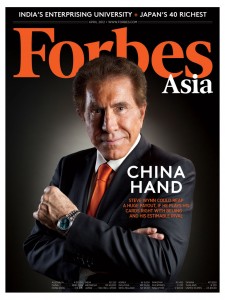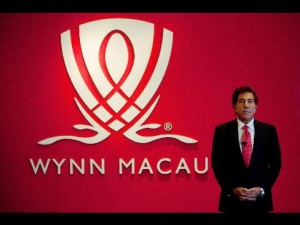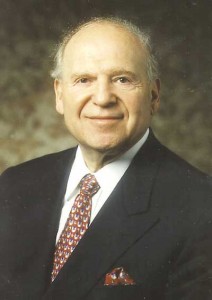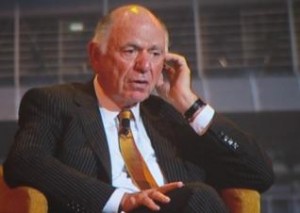“Macau giveth and Macau taketh away for Wynn Resorts.” With that sentence the Las Vegas Review-Journal‘s Richard Velotta pithily summarized the precipitous reliance that  Wynn and other Macanese operators have on that unpredictable market. “Our hopes for a turnaround during Chinese New Year turned out to be incorrect,” said CEO Steve Wynn, announcing a first-quarter loss of $45 million. He added that he’d even be satisfied with a flat 2Q15 but isn’t anticipating one. Given the Macao-heavy tilt of Wynn Resorts’ balance sheet, a 2% improvement in Las Vegas doesn’t count for much against a 38% decline in China (with VIP play down 52%), where the forecast is clouded by social unrest and a continuing government campaign to root out graft.
Wynn and other Macanese operators have on that unpredictable market. “Our hopes for a turnaround during Chinese New Year turned out to be incorrect,” said CEO Steve Wynn, announcing a first-quarter loss of $45 million. He added that he’d even be satisfied with a flat 2Q15 but isn’t anticipating one. Given the Macao-heavy tilt of Wynn Resorts’ balance sheet, a 2% improvement in Las Vegas doesn’t count for much against a 38% decline in China (with VIP play down 52%), where the forecast is clouded by social unrest and a continuing government campaign to root out graft.
Wynn blamed some of his problems on a “cloudier” atmosphere in Macao — and he wasn’t referring to the air pollution. Mentioning delays in a light-rail project that prompted a government official to publicly apologize, the CEO said, “If that’s going on at the highest levels of the government in Macau, you can imagine … what happens as it filters down to those of us who are part of the resort industry.”
Although Wynn Resorts substantially undershot Deutsche Bank analyst Carlo Santarelli‘s projections, he predicted that Wynn Palace would be “a category killer,  regardless of the overall Macau environment.” Wynn himself blamed a miss of the Chinese New Year 2016 opening on labor-allotment issues. Channeling his inner imperialist, he scapegoated the average Macao resident: “These jobs, after all, are people from mainland China just on the other side of the fence. But there’s pressure locally. I guess it’s sort of, the locals don’t want the streets too crowded or something, and they put pressure on the local government officials and they respond – they’re very sensitive to local pressure.” Damn that governmental responsiveness!
regardless of the overall Macau environment.” Wynn himself blamed a miss of the Chinese New Year 2016 opening on labor-allotment issues. Channeling his inner imperialist, he scapegoated the average Macao resident: “These jobs, after all, are people from mainland China just on the other side of the fence. But there’s pressure locally. I guess it’s sort of, the locals don’t want the streets too crowded or something, and they put pressure on the local government officials and they respond – they’re very sensitive to local pressure.” Damn that governmental responsiveness!
Wynn is still unconvinced of recovery in Las Vegas. Who can blame him when his Strip room revenues fell 3% and occupancy was only 83%? Rather than increase leverage, Wynn exerted fiscal discipline and trimmed its dividend by two-thirds. Unfortunately, this prudence was rewarded with a 10% drop in the stock price.
* That thing atop Sheldon Adelson‘s head was looking more synthetic than usual as he took the stand to testify against former Sands China CEO Steven Jacobs. In testimony that  reflected poorly on his own business judgment, Adelson characterized Jacobs as inexperienced and ruinous toward Sands China. (Shades of his years-ago testimony that then-COO William Weidner had violated his fiduciary responsibility to Las Vegas Sands — but Adelson kept him on anyway.)
reflected poorly on his own business judgment, Adelson characterized Jacobs as inexperienced and ruinous toward Sands China. (Shades of his years-ago testimony that then-COO William Weidner had violated his fiduciary responsibility to Las Vegas Sands — but Adelson kept him on anyway.)
“He was one of the least competent and potentially destructive executives I had in over 50 companies in my 69-year business career,” Adelson said, forcing the question, How did Jacobs get there? How did a supposedly “delusional” executive rise so high in Adelson’s hierarchy?
The ostensible purpose of the hearing was to determine whether Las Vegas courts have jurisdiction over Jacobs’ wrongful-termination lawsuit. As his lawyers’ filing put it, “While Sands China publicly holds itself out as being headquartered in Macau, its true headquarters are in Las Vegas, where all principle [sic] decisions are made and direction is given by executives acting for Sands China.” It’s easier to believe that than Sands’ counterclaim that holding the trial a short drive from Sands HQ creates “significant burdens.” (Not too significant to prevent Adelson from micromanaging the layout of Macanese casino floors.) Remember, this was the company that was found to be hiding evidence in Las Vegas while claiming it was still back in Macao.
Adelson also was quick to throw recent COO Michael Leven under the bus, calling him “hypnotized” and saying Jacobs “convinced Mike that he was the greatest thing since sliced  bread. I disagreed” … but apparently did nothing. (Don’t ask Sheldon Adelson for a character reference when your usefulness is ended.) Having verbally kicked Leven in the posterior, Adelson predicted he “will come in and say he made a mistake.” Interestingly, Leven has already testified and apparently made no such recantation.
bread. I disagreed” … but apparently did nothing. (Don’t ask Sheldon Adelson for a character reference when your usefulness is ended.) Having verbally kicked Leven in the posterior, Adelson predicted he “will come in and say he made a mistake.” Interestingly, Leven has already testified and apparently made no such recantation.
When not hurling hyperbole like the accusation that Jacobs “tried to kill the company,” Adelson had some substantive points to make. The chief one was that Jacobs had attempted to cut out the middlemen (i.e., junket operators) and market directly to VIP players. Said Adelson, “we told him not to get involved with direct premium players the way he wanted to. He kicked off all the junket reps. Now, we have to build back the relationship.” Yet Sands had announced this policy nine months earlier in an SEC filing. Where was Adelson then?
The CEO gave himself a ringing endorsement: “Not once in 69 years has anybody said this is a bad thing that Sheldon Adelson did.” But if his welter of contradictions is a preview of Adelson’s testimony at trial, he’d better start mentally preparing himself for an adverse verdict.


Wasn’t this the guy that had the moving vans backed up and ready to move to China? Things change don’t they?